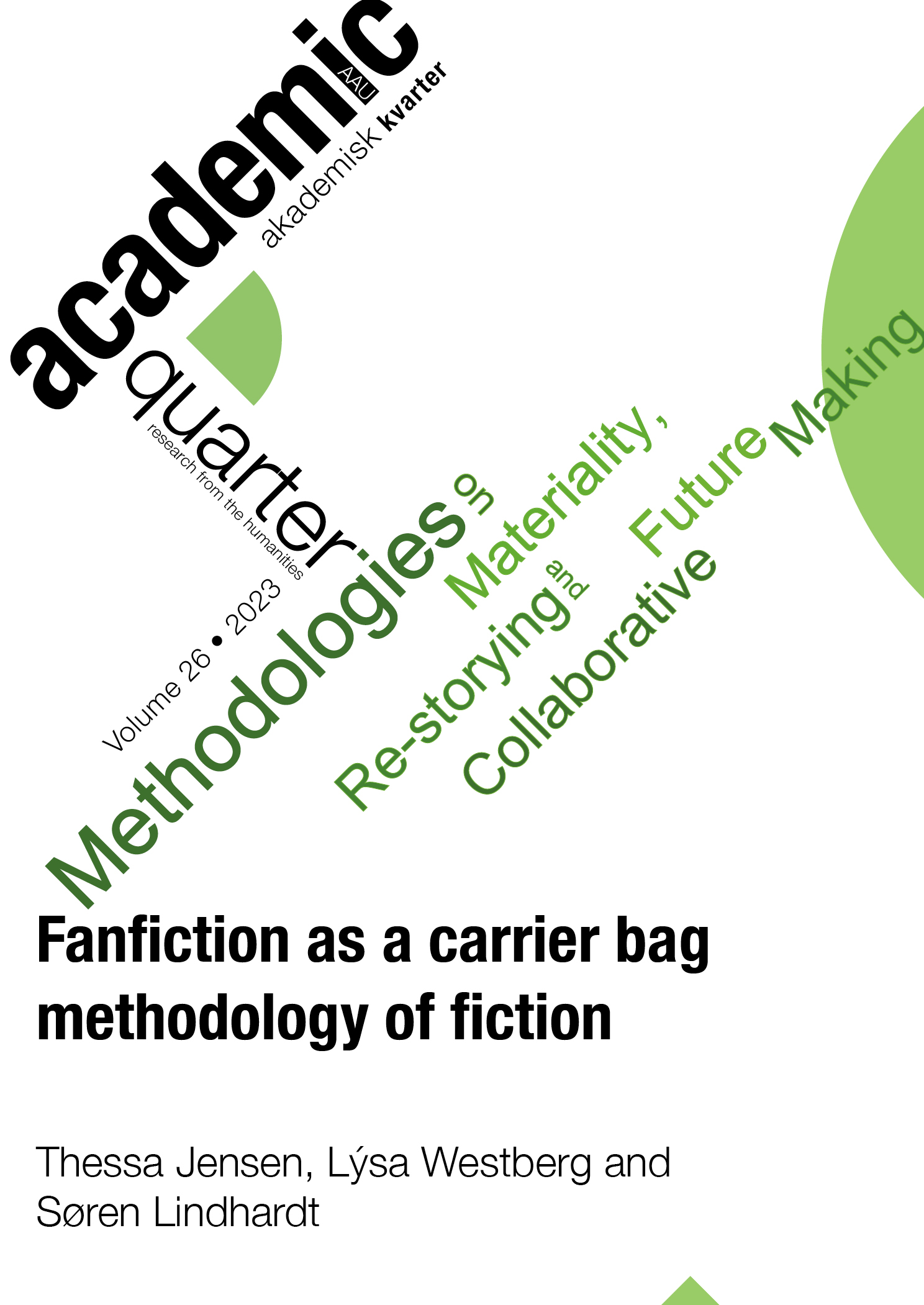Abstract | Abstract
This paper provides a short introduction to fanfiction as an example of Le Guin’s Carrier Bag Theory of Fiction. Through the analysis of the fanfiction drabble, this paper gives an initial outline of a methodology for the carrier bag theory, showing how the process of writing is supported by the community that surrounds fanfiction. As such, the writing and publishing of fanfiction can be seen as exemplary of a democratic, bottom-up method for creating the other stories, or life stories, in Le Guin’s and Haraway’s sense.
Referencer
Booth, Paul. 2015. Playing Fans. Negotiating Fandom and Media in the Digital Age. Iowa City: University of Iowa Press. https://doi.org/10.1353/book38201
Busse, Kristina, and Karen Hellekson. 2006. “Introduction: Work in Progress.” In Fan Fiction and Fan Communities in the Age of the Internet, edited by Karen Hellekson and Kristina Busse, 5-32. McFarland & Company, Inc., Publishers.
Coppa, Francesca (ed.). 2017. The Fanfiction Reader: Folk tales for the digital age. University of Michigan Press. https://doi.org/10.3998/mpub.9479376
Derecho, Abigail. 2006. “Archontic Literature: A Definition, a History, and Several Theories of Fan Fiction.” In Fan Fiction and Fan Communities in the Age of the Internet, edited by Karen Hellekson and Kristina Busse, 61-78. McFarland & Company, Inc., Publishers, 2006.
Galbraith, Patrick W. 2015. “Moe Talk: Affective Communication among Female Fans of Yaoi in Japan.” In Boys Love Manga and Beyond: History, Culture, and Community in Japan, edited by Mark McLelland, Kazumi Nagaike, Katsuhiko Suganuma, and James Welker, 153-168. Jackson, MS: University of Mississippi Press.
Haraway, Donna Jeanne. 2016. Staying with the trouble: Making kin in the Chthulucene. Durham: Duke University Press. https://doi.org/10.2307/j.ctv11cw25q
Haraway, Donna Jeanne. 2020. “Introduction: Receiving three Mochilas in Colombia: Carrier bags for staying with the trouble together.” Introduction to The Carrier Bag Theory of Fiction (Terra Ignota), by Ursula K. Le Guin, 9-22. London: Ignota Books.
Hermes, Joke. 2005. Re-reading the Popular Culture. Malden, MA: Blackwell Publishing. https://doi.org/10.1002/9780470776568
Hills, Matthew. 2002. Fan Cultures. Oxon, England: Routledge. https://doi.org/10.4324/9780203361337
Jensen, Thessa, and Lýsa Westberg. 2016. “Game of Emotions.” Unpublished paper presented at Game Scope Conference, Aalborg University, 26 August 2016.
Jensen, Thessa. 2018. Fanfiktion. Et levende online fællesskab. Aalborg: Aalborg Universitetsforlag.
Karpovich, Angelina I. 2006. “The Audience as Editor. The Role of Beta Readers in Online Fan Fiction Communities.” In Fan Fiction and Fan Communities in the Age of the Internet, edited by Karen Hellekson and Kristina Busse, 171-188. McFarland & Company, Inc., Publishers.
Le Guin, Ursula K. 2019. The carrier bag theory of fiction. London: Ignota Books.
Langford, David. n.d. “A Very Short Anthology.” Accessed 10 July 2023. https://ansible.uk/writing/drabbles.html
Nybro Petersen, Line. 2022. Mediatized Fan Play. Moods, Modes and Dark Play in Networked Communities. Oxon, Routledge. https://doi.org/10.4324/9781351001847
OTW. Organization for Transformative Works. n.d. Last accessed 5 July 2023. https://www.transformativeworks.org/
Raymond, Eric. 1999. “The cathedral and the bazaar.” Knowledge, Technology & Policy 12 (3): 23-49. https://doi.org/10.1007/s12130-999-1026-0
Snape100. The Drabble Dungeon. Last accessed 27 July 2023. https://snape100.livejournal.com/
Snupin100. Snape/Lupin Drabble Community. Last accessed 27 July 2023. https://snupin100.livejournal.com/
Vogler, Christopher. 2007. The Writer’s journey. Studio City, CA: Michael Wiese Productions.
Ximeria. 2021. Legend of Zelda Bingo Card. Triforce HQ Server @ Discord, 2022. Last accessed 27 July 2023.

Dette værk er under følgende licens Creative Commons Navngivelse – Ikke-kommerciel – Ingen Bearbejdede Værker (by-nc-nd).
